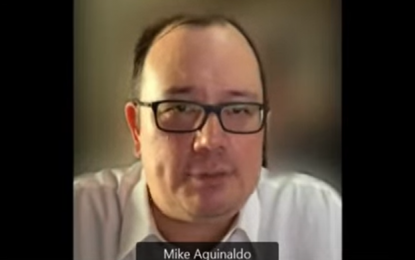
COA Chairman Michael Aguinaldo (File photo)
MANILA – The Commission on Audit (COA) on Wednesday said its audit report did not mention any "overpricing" in the procurement of personal protective equipment (PPE) and other Covid-19 supplies made by the Department of Budget and Management-Procurement Service (PS-DBM).
During a hearing of the House Committee on Good Government and Public Accountability, COA Chairman Michael Aguinaldo said the observations made in the report pertained more to the inventory management of the PS-DBM and does not say anything on the alleged overpricing of the medical supplies.
"Wala po sa COA report ng PS-DBM ang statement na may overpricing (There is no statement in the COA report on the PS-DBM saying that there was overpricing). There's no statement to that. The observation is related more to inventory management than overpricing. So hindi po tama na sabihin na ang COA ang nagsabi na may overprice kasi wala pong sinabing ganun doon sa report (So it's not right to say that COA mentioned something about overpricing because nothing of that sort was in the report)," Aguinaldo said.
COA has flagged the DOH for transferring PHP42.4 billion worth of funds to PS-DBM for the procurement of Covid-19 supplies.
The PS-DBM awarded Pharmally Pharmaceuticals Corporation contracts worth PHP8.68 billion for the purchase of PPE and testing kits, which were believed to be overpriced, at the onset of the Covid-19 pandemic last year.
During the same hearing, former PS-DBM director and now deputy Ombudsman Warren Liong said the medical supplies were not overpriced, noting that the prices were lower compared to the suggested retail price of the Department of Health.
"Overpriced ba talaga ang PPEs na binibili ng gobyerno noong 2020? Hindi po. Dahil tumaas ang presyo ng face masks noong panahon ng pandemya, naglagay po ang DOH ng suggested retail price, so price freeze it was placed at PHP28. Ang halaga po ng binili ng gobyerno ay PHP27.72, somewhere actually lower (Were the PPE sets purchased by the government in 2020 really overpriced? No. Since the price of face masks during the [start of the] pandemic increased, the DOH suggested a retail price and price freeze at PHP28. The price the government paid was PHP27.72, somewhere actually lower)," Liong said.
No ghost deliveries, no corruption
Liong said there were no "ghost deliveries" of medical supplies, adding that around 500,000 pieces of surgical masks from Pharmally were already readily available.
"Their face masks were readily available. In my presentation, I showed the deliveries of other suppliers as well when they were delivered to show that lahat ng binili po natin (all that we purchased) were delivered," he said.
He said there is also an inspection certificate and acceptance report (ICAR) to prove that the Covid-19 supplies were delivered.
"Our system is made pursuant to RA (Republic Act) 9184, so ayaw po niya pumayag kami na walang ICAR (so the procurement won't be possible without an ICAR)," he said.
Supervising auditor for the Department of Health (DOH) Rhodora Ugay, meanwhile, said the COA report did not flag the health agency for corruption, overpricing, or ghost deliveries.
Ugay said the report only flagged the transfer of funds because it had no required memorandum of agreement and supporting documents such as the liquidation of pending procurements.
Compliant with existing laws
Aguinaldo said the process of emergency procurement is consistent with existing laws such as Republic Act (RA) 9184 or the Government Procurement Reform Act, Government Procurement Policy Board issuances (GPPB), and other further of RA 11469 of Bayanihan to Heal As One Act.
"Under the law, Bayanihan 1, the President was authorized to procure expeditiously as an exemption from [RA] 9184 and related laws. But nonetheless, the DBM, and I'm guessing the Office of the President as well, agreed to apply the rules on emergency procurement with perhaps little modifications, which is reflected in the GPPB circular 01-2020," Aguinaldo said.
"While they could have done away with that, because siguro (maybe we) pandemic tayo, and Congress saw fit that a President should have that authority to procure as expeditiously as possible, there seems to have been an effort to put some order in the procurement process by applying emergency procurement rules as reflected in the GPPB circular of April 6, 2020," he added.
Under the Bayanihan Act, the government may undertake the procurement of PPE gears and other medical supplies “in the most expeditious manner” as exemptions from RA 9184 and other relevant laws.
The law also allows “emergency” negotiated procurement “in case of imminent danger to life or property during a state of calamity, or when time is of the essence arising from natural or man-made calamities or other cases where immediate action is necessary.
Last week, senators expressed concern why a bulk of government contracts for the purchase of Covid-19 medical supplies went to Pharmally, which existed only six months before the pandemic.
Pharmally was registered in September 2019 with the Securities and Exchange Commission with a paid capital of PHP625,000. (PNA)
